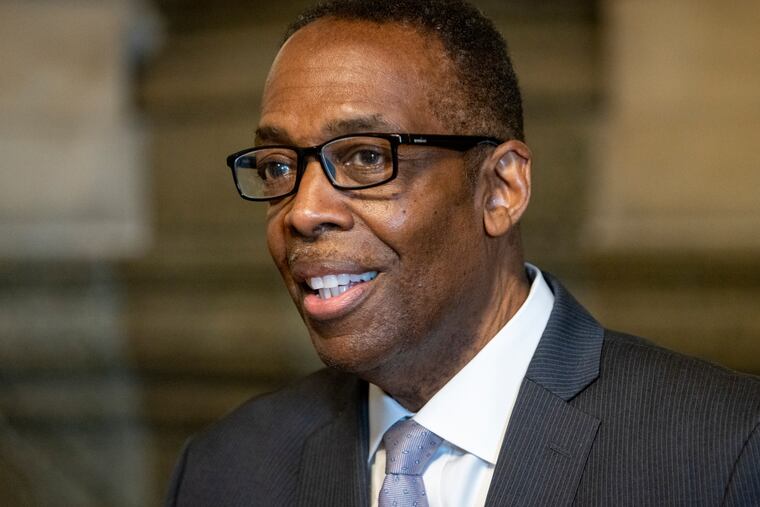Darrell L. Clarke’s retirement ends four decades of Philadelphia City Council leadership. Here’s why it matters and what happens next.
The Council president is one of the most powerful political figures in Philadelphia and holds enormous sway over all sorts of policy affecting residents and businesses.

Philadelphia City Council President Darrell L. Clarke announced Thursday he does not intend to seek reelection, setting off a massive shift in city leadership that could impact residents for years to come.
Clarke will be replaced as president in January when the next Council is sworn in — the same time that a new mayor will take office.
Here’s what you need to know about what this means for Philadelphians and what could happen next.
Why does Clarke’s departure matter?
The Council president is one of the most powerful political figures in Philadelphia and holds enormous sway over all sorts of policy related to taxes, housing, development, and how the city spends billions of dollars every year.
Clarke has held the post for 11 years, spanning two mayoral administrations, and Council conducts business in a way reflective of his conflict-averse leadership style.
While past presidents presided over Council meetings that featured members openly clashing, under Clarke, legislation was rarely brought to a vote without near unanimous support, and negotiations happened largely behind closed doors.
What does the Philly City Council president do?
The Council president’s office, in consultation with other Council leadership, decides what legislation is considered, if it gets a hearing, and when it comes up for a vote. The Council president schedules and presides over weekly meetings, and he or she casts the final vote on bills.
In addition, the Council president appoints members to a variety of standing committees, where hearings are held and details of legislation are hammered out. Members who maintain a good relationship with the Council president can be rewarded with more powerful committee assignments or chairmanships.
Clarke’s salary is $167,000 annually.
Why is this happening now?
All 17 Council members are up for election this year, and candidates need to file nomination petitions by early March in order to get on the ballot. Feb. 14 was the first day candidates were allowed to begin circulating petitions, meaning candidates for office need to decide if they are running.
What happens next?
Clarke’s departure will set off two simultaneous contests to replace him as a Council member and as Council president.
First: A handful of candidates are expected to run in the Democratic primary this May to become the next Council member representing the 5th Council District. The district includes much of North Philadelphia, Strawberry Mansion, Brewerytown, Fishtown, parts of Center City, and the area around Temple University.
Second: Members of Council will start jockeying to replace him as Council president. That person will almost certainly be a Council veteran, not the person elected to represent the 5th District.
Who will run for Clarke’s 5th District seat?
Clarke’s former chief of staff Curtis Wilkerson has taken steps toward running and Clarke has endorsed him, which could give Wilkerson a leg up with Democratic ward leaders.
Aissia Richardson, a staffer for State Sen. Sharif Street (D., Phila.), has said she planned to run if Clarke doesn’t. Street is the chair of the state Democratic Party and also holds sway with ward leaders.
Attorneys Jeffery “Jay” Young Jr. and Patrick Griffin have each filed paperwork with the city to run.
Jon Hankins Jr., president of a fashion company, has also already announced he is running.
Former ward leader John Scott is also among the potential candidates.
The district is heavily Democratic, so the winner of the May 16 primary is all but guaranteed to become a Council member.
Who could become Council president?
Any member of Council can be elected president. But it is traditionally awarded to one of the body’s 10 geographically based district Council members, not one of the seven members who represent the city at-large. And it will almost certainly be a Democrat, as the party is likely to hold at least 14 of Council’s 17 members.
The Council president is always a veteran of the legislative body, of which there are only a few. Next January, at least 12 members out of 17 will have served one term or less.
All four veteran Democratic Councilmembers — Curtis Jones Jr., the current Democratic majority leader, Mark Squilla, the majority whip, as well as Kenyatta Johnson and Cindy Bass — said they’re considering running to succeed Clarke.
Who picks the next Council president?
Council’s leadership team, including the Council president, is elected by the members of City Council at the beginning of each four-year term, similar to how other legislative bodies, like Congress, pick leaders. Whomever garners votes from a majority of the 17-member body will take the helm.
The race to get those nine votes will largely take place behind closed doors and could continue after new members take office in January. A leadership vote will take place soon after swearing in, as Council can’t move legislation without a Council president, leadership team, and standing committees.
What does all this mean for the next mayor?
A Council president can make or break a mayor’s agenda by agreeing to shepherd their legislative priorities or stifling them before they reach a vote.
Mayor Jim Kenney hinted at the importance of a mayor’s relationship with the Council president recently, saying earlier this month that his key piece of advice to the next mayor is: “Be friends with the Council president.”
Kenney, a former Council member, speaks with Clarke regularly, and Clarke has generally been amenable to working with Kenney on his priorities. That stands in contrast to former Mayor Michael Nutter, who often clashed with Council during Clarke’s tenure and saw some of his policy priorities falter.